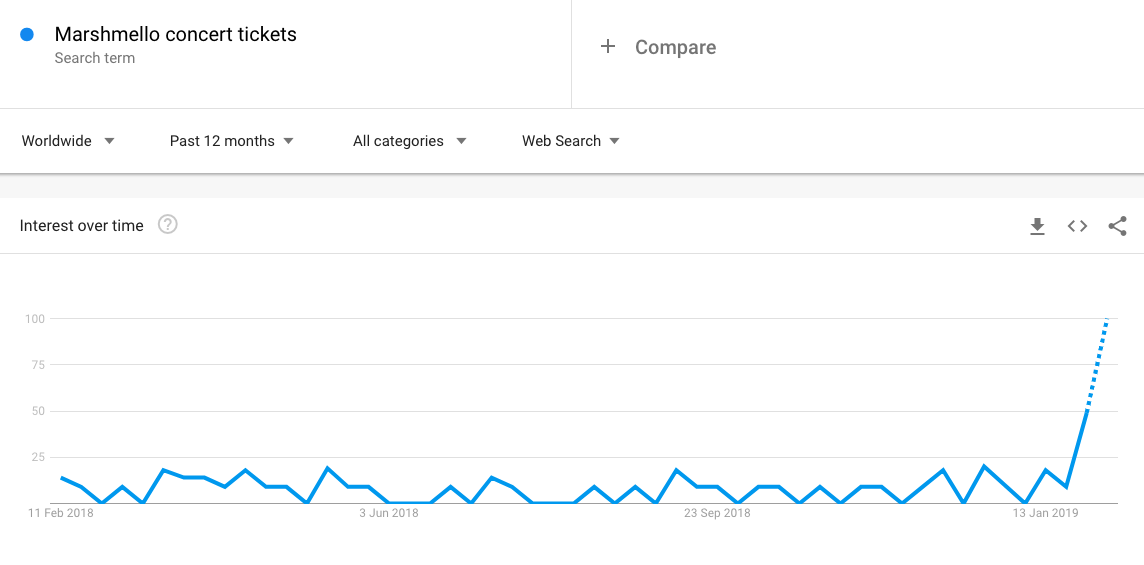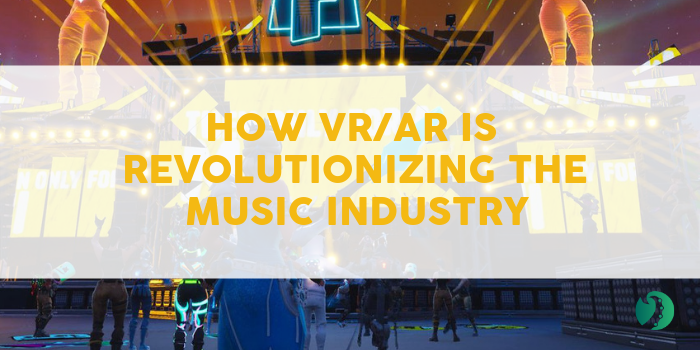If you’ve ever been to a concert or festival, then you know the fun comes for a price. From the pain of waiting in line to get a drink, withholding from breathing while hitting the porta-potty, anxiously trying to find then stay in sight of your friends, dying phone batteries, $10 hot dogs... the list goes on. What would you say if I told you I could solve ALL those problems and then some? Well, now with Virtual Reality (VR) and Augmented Reality (AR), we can. The use of AR outside of video games is nothing new in 2019. From Snapchat filters to Pokemon GO, AR is ubiquitous and isn’t showing signs of going anywhere, anytime soon.
Last week, popular DJ artist Marshmello performed a live set on the global phenomenon platform of Fortnite, attracting over 10 million fans online. Let me repeat that. 10 million real and unique individuals. Reports indicate that following the live stream, Google global search queries for ‘Marshmello concert tickets’ showed a significant spike for the artist, enough to fill an entire US sports stadium of fans.
Along with providing a unique, immersive experience for fans of all ages, virtual performances allow for special effects that simply wouldn’t be possible in real life. For example, players in the Fortnite platform were fully immersed in the experience by grooving along to the music and were even flown into the sky as the stage joined them.
It doesn't stop there. In late 2018, the League of Legends world championship opened with an AR K-pop concert that was intended to promote its four new K/DA skins. The concert drew over 20 million fans within four days as AR versions of the characters entertained by emerging in thin air and gliding across the stage, alongside real-life counterparts. By streaming the performance online, League of Legend’s Riot Games is able to tap into a whole new fan base: fans that used to play, K-pop enthusiasts, Overwatch fans, and (reports say) the LGBTQ+ community.
Because of the success of these music events and big names such as Coachella utilizing a AR app for festival goers, many boast that these streams allow fans the large-scale, in-home entertainment without the downsides of long lines and overpriced street food. Although 2D experiences are obviously not as immersive as a real-life event, it feels pretty darn close.
People are quick to assume that kids today have copious amounts of disposable income, but that simply isn’t true. Studies say that millennials instead save their money and are more skeptical about where they spend it, as there is large distrust in traditional advertising methods. By hosting a virtual performance for fans, businesses allow for a larger audience of those who are unable to purchase concert tickets due to financial, personal, or health reasons. Not only does a live stream tap into a new avenue for a more diverse fan base, but it’s also a great opportunity for the festival to gain exposure before the day of the event by providing a sneak peek of what their event will be like in real life. As immersive technologies drive deeper, more powerful connections with fans, they are much more likely to commit to buying tickets for real-life events. Marshmello’s Fortnight concert demonstrated this perfectly - where he had more fans “looking for tickets on Songkick during the past 4 days than he’s had over the past 3 months combined.”

Still unconvinced of the power of AR/VR? Hosting a live VR stream prior to your real life event or in lieu of means that fans are fully engaged in the moment instead of distracted trying to get that perfect “I’m here and you’re not!” snap for their Insta-story. Smartphones don’t exist in virtual stadiums, which ironically allows fans to completely immerse themselves and be present for the full experience. In addition to this, fans have the ability to control their experience while having access to their idols, without the frustrations of external situations (think crowded, sweaty bodies in your personal space and hour-long queues for expensive drinks). Bottom line? AR and VR allow for a more personal, memorable and immersive experience.
AR integrations like the ones mentioned above bring the adrenaline of the party to your living room, without all the impractical inconveniences that real events bring. Could VR be the future of live music events? Time will tell, but until then, let us help you take your music events to the next level with VR. Contact us for a free fan-based marketing consultation.
